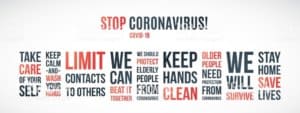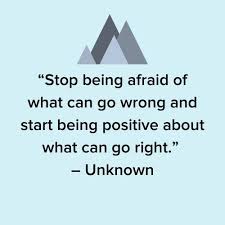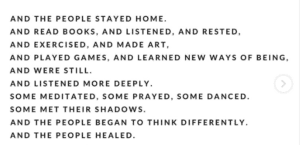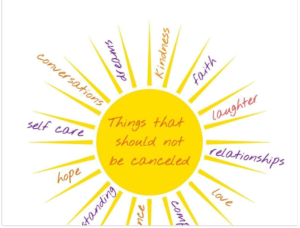
“Often when you think you’re at the end of something, you’re at the beginning of something else.”
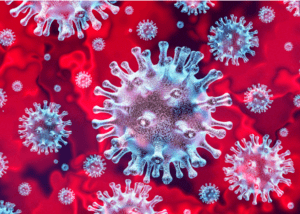
Given the constant stream of negative news about the novel coronavirus pandemic, it’s easy to feel anxious and uncertain. Anxiety is also an understandable reaction, since coronavirus has made many of us change our daily routines, and threatens our sense of safety. It can be difficult to let go of these thoughts and feelings.
But, we can also try to use anxiety to develop habits that can protect our mental health by adding positivity in times of such a huge pandemic.
Our brain has the capacity to change and “rewire” in response to our experiences. We call this capacity “neural plasticity”. If we have recurrent, anxious thoughts, we are establishing neural connections that make thinking anxious thoughts easier for us the next time we do so.
But we can also use anxious thoughts as triggers for engaging in activities and thoughts that help manage and reduce anxiety. In this way, we can transform anxiety into one of the first building blocks of habits ( positivity ) that can support our wellbeing when we face challenging circumstances.
So the next time you notice anxious thoughts racing through your mind, or feel your shoulders tensing up from worry, try one of these activities to manage your anxiety – and change it into positive mental health habits in the future.
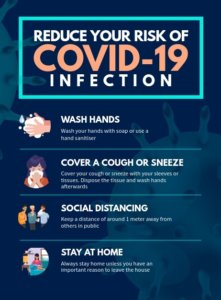
“People today really value workplace flexibility and remote work because it allows them to focus their energies on work and life as opposed to commuting or other complications due to geography.”
Click here for What is COVID-19?
COVID-19 is the disease caused by an infection of the SARS-CoV-2 virus, first identified in the city of Wuhan, in China’s Hubei province in December 2019. COVID-19 was previously known as the 2019 Novel Coronavirus (2019-nCoV) respiratory disease before the World Health Organization (WHO) declared the official name as COVID-19 in February 2020.
The SARS-CoV-2 virus belongs to the family of viruses called coronaviruses, which also includes the viruses that cause the common cold, and the viruses that cause more serious infections such as severe acute respiratory syndrome (SARS), which was caused by SARS-CoV in 2002, and Middle East respiratory syndrome (MERS), which was caused by MERS-CoV in 2012.
Like the other coronaviruses, the SARS-CoV-2 virus primarily causes respiratory tract infections, and the severity of the COVID-19 disease can range from mild to fatal. Serious illness from the infection is caused by the onset of pneumonia and acute respiratory distress syndrome (ARDS).
Symptoms
The most common symptoms of COVID-19 include dry cough, fever, and shortness of breath. It is thought that symptoms can appear between 2-14 days after exposure although there have been isolated cases that suggest this may be longer. If you develop symptoms, you should stay at home to prevent the spread of the disease into the community.
Wearing a face mask will help prevent the spread of the disease to others.
According to research published in the Annals of Internal Medicine, the median incubation period is estimated to be 5 days, and almost all (~98%) patients who have been infected will develop symptoms within 12 days.
A new study suggests losing your sense of smell and taste is an early sign of COVID-19.
Six new symptoms have been added to the list of COVID-19 symptoms to include: chills repeated shaking with chills, muscle pain, headache, sore throat, and new loss of taste or smell.
Transmission
The SARS-CoV-2 virus is thought to spread from person-to-person via:
• droplet transmission (large respiratory droplets that people sneeze, cough or drip)
• aerosol transmission (when someone coughs or sneezes in the room)
• contact transmission (touching a contaminated surface then touching your mouth, nose or eyes)
• direct transmission (kissing, shaking hands, etc.)
Prevention
The best way to prevent infection is to avoid exposure to the virus.
The most important way to prevent COVID-19 is to WASH YOUR HANDS.
Wash your hands regularly and thoroughly with soap and water (lather for 20 seconds) OR use an alcohol-based (at least 60%) hand sanitizer.
Other actions that help to prevent the spread of COVID-19:
• avoid contact with others who are sick
• avoid touching your mouth, nose, eyes or face
• cover coughs and sneezes (into a tissue or into your elbow)
• clean and disinfect surfaces (alcohol or bleach-based cleaning solutions work best for coronaviruses)
• face masks will not protect you from COVID-19 directly, but can help in reminding you to avoid touching your face, and will help prevent the spread of the disease to others.
• social distancing
• self-isolation
What to do if you are sick
• Prevent the spread of COVID-19 if you are Sick (CDC)
• Environmental Cleaning and Disinfection Recommendations (CDC)
What to do if you come into contact with someone who is sick
Stay at home. If you have been exposed to someone who has tested positive for COVID-19 or someone who is showing symptoms of COVID-19, it may take up to two weeks for your symptoms to present. To keep yourself and others safe, you should isolate yourself from other people for 14 days.
What is Social Distancing – Social distancing means the physical separation of people. To practice social or physical distancing:
• Stay at least 6 feet (2 meters) from other people
• Do not gather in groups
• Stay out of crowded places and avoid mass gatherings
Risk Factors – Scientists are still researching risk factors for COVID-19 but data from China CDC suggest that the elderly, and people suffering from pre-existing medical conditions (such as heart disease, respiratory disease including asthma and COPD, or diabetes) have a higher risk of dying from the disease.
There is research that suggests that smokers may be more susceptible to the SARS-CoV-2 virus. There is also evidence to suggest that people who use e-cigarettes (vaping) are at a much higher risk of developing serious respiratory infections.
The secret of crisis management is not good vs. bad, it’s preventing the bad from getting worse
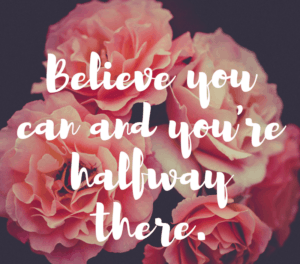
Click here for COVID-19 Positivity
Our article is designed to offer practical advice, provide some entertainment, foster a sense of social cohesion, and remind people of the good in the world during these strange and isolating times.
With all the tragic things that are happening in the world as a result of the coronavirus, now might seem like an unusual time to talk about being positive. Yet staying positive is a core ingredient in the recipe for successful coping in a crisis.
Now, more than ever is the time for us to be proactive about creating small moments of happiness in our days, given the findings in psychology research that positive emotions help us to undo the negative effects of stress. I’ll come to the research in a minute, but first, there are a few really practical things you can do to foster positive emotions.
• Savour the small moments: Even during a lockdown you still have many small moments to savor. The smell of coffee, the feel of the warm shower on your back, and so on. When you stop to take in these moments, rather than let them rush by on automatic pilot, you are giving your brain a chance to process the pleasure, which boosts your serotonin – the feel-good neurotransmitter that helps elevate your mood and make you feel calm.
• Strengthen your connections: for those of us in family lockdown, now is the opportunity to spend quality time with our loved ones. Take the time to hug your kids or partner, look them in the eyes, have long conversations with them – all of these gestures promote closeness and also boost your oxytocin, which is a hormone that bonds people and also has a calming effect on your body. When your oxytocin levels spike they tell your body to switch off cortisol, the stress hormone.
• Look for the good in others: These types of crises can bring out both the worst and the best in human nature. This week there were two Youtube clips that went viral in Australia about toilet paper. One was of three grown women fighting in Woolworths over a packet of toilet paper.
The other was two young children dragging a large cart of toilet paper behind them and stopping at the homes of elderly people in their neighborhood to give them a roll. I like to think that the best in human nature is rising to the coronavirus challenge. Philanthropists are donating money to scientists to find a cure.
Doctors and medical staff are working overtime to help sick patients. Neighborhoods are putting together care packages for people who are sleeping rough. People are posting positive messages on social media. Friends from across the globe reaching out to each other.
When we tune into these positive and pro-social aspects of the crisis, we are united in hope. By tuning into these three silver linings, you can potentially change your brain chemistry and build up your energy stores to help you cope with the other aspects of your day that have been made more difficult.
Taking charge of our mental health and capturing the small moments will help as we go further into the unknown, too. If we can foster positive emotions, the flow-on effects are well researched, and well documented. In fact, positive emotions are a key resource for us during the coronavirus crisis because they can do a number of things:
• Increase your resilience – Research has shown that when we experience positive emotions on the back of a stressful event, we bounce back more quickly and have a faster “cardiovascular recovery” time – our heart rate lowers and our blood pressure stabilizes more quickly when we are able to be positive.
• Increase your immunity – a study where people were deliberately infected with the influenza virus and rhinovirus found that those people who had more positive emotions were more likely to fight off the symptoms. People low on positive emotions were 2.9 times more likely to contract a respiratory illness in this study.
• Make you think more clearly – the way we feel influences the way we think. Positive emotions boost our problem-solving abilities as well as our judgment, decision-making, cognitive flexibility, and creativity. Staying positive will help you and your kids to be better at solving all the little problems that are being thrown our way right now, such as figuring out new technology platforms for working (and schooling) from home.
• Practice self-care – When you feel anxious or overwhelmed, the simplest thing you can do is to just take three slow, deep breaths to calm down. Count slowly to four as you breathe in and then count slowly to five as you breathe out.
This simple exercise helps increase activation in the parasympathetic nervous system, which is associated with resting and digesting.
It also reduces the activity of the sympathetic nervous system, which is responsible for our fight or flight response – and is linked to anxiety. When possible, listening to your favorite upbeat song or a brief physical exercise at home can help improve your mental health and reduce anxiety.
Do something relaxing – After waking up and just before you go to sleep, try to do things that are relaxing and uplifting. What you do early in the morning sets the mood for the day. If you notice having anxious thoughts soon after waking, try to think about something positive if you can. Or, do a few mindful stretches and focus on the sensations in your body.
In the evening, try to avoid reading news or comments on social media about the virus spread extensively. Negative emotions experienced in the evening impact sleep quality. Listening to a calming podcast, practicing meditation, or relaxation techniques might help calm anxiety before bed.
Notice the small things – Reading the latest news about COVID-19 and planning all the changes to your work, childcare, or travel plans can lead to a nearly constant stream of stressful or anxious thoughts. When you notice the worry building up, try to look or listen to the things around you.
Notice flowers in your garden, clouds in the sky, or the sound of a bird outside and take a couple of minutes just to see or listen. This simple mindfulness practice not only gives your busy mind a bit of a break, but it also may reduce activity in the midline structures of the prefrontal cortex of the brain involved in anxious rumination. As a result, you may find that you start feeling less anxious.
Do something to help – Some people might react to anxiety with hoarding behaviors. This is perhaps reflected in the panic-buying and stockpiling of groceries in response to the coronavirus pandemic. Others respond to anxiety with compassion, through prosocial behaviors such as helping or sharing. Prosocial behavior can protect our wellbeing.
Put things into perspective – Our mind has a built-in negativity bias making us think of and remember negative events better than positive ones. From an evolutionary perspective, this was important so that we would remember not to eat certain foods that made us ill a second time, for example.
But this also means that we notice and remember negative news over positive events. Knowing this, when you feel anxious try to make a conscious effort to overcome the negativity bias.
This might mean changing your perspective and trying to remind yourself of the many positive things that have happened because of coronaviruses – such as examples of kindness, or reductions in pollution.
Research shows that increased hope strongly predicts decreases in anxiety.
Meditate or Pray – Over 80% of adults in the USA identify as spiritual or religious. Spirituality and religiousness have been associated with better wellbeing, particularly because they give us a sense of purpose and meaning in life. Having a sense of purpose and meaning can also protect us against anxiety.
You can use your feelings of anxiety as a reminder to meditate or say a short prayer. Even brief regular meditations may reduce anxiety levels.
Of course, different activities might work better for different people. To get started, the next time you feel anxious to make a list of a couple of activities that you know will help calm you down. Then try to do these things the next time you feel anxious to eventually turn your negative thoughts and feelings into habits that support your mental health.
In this way, you will be creating new connections in the brain that will associate anxiety with something positive instead of an endless spiral of negative thoughts and feelings. With practice, you may find that anxiety you may have in response to the negative headlines becomes less threatening and easier to let go of.
Every dark cloud has a silver lining and this is your chance to thicken that lining and take charge of your mental health so that you come out of this experience stronger.
“Today, give yourself permission to be outrageously kind,
irrationally warm, improbably generous. I promise it will be a blast.”

Click here for Staying Positive during Lockdown –
Positivity
We all are hoping to get a moment that’s positive. News, WhatsApp, social media of other kinds, and plenty of government directives – all are pushing us to the brink of sadness, if not the depression of some kind. We know the virus is real, it’s fast-spreading and it’s here to stay for a bit for sure.
So what can we do to stay happier? We take a look at the way of staying positive during coronavirus:
1. Get moving: Physical activity is a great way to send positive hormonal signals up to your mind. Walk around the house. Get that skipping rope from the attic and put it to good use. If you have staircase access, do step-ups and shake up your calf muscles. Yoga or any form of such effort is good for mental and physical health.
2. Cut down on food-: Stay light, eat less. This is because you are not spending time walking your usual steps (even the ones outside a fitness regime) like going to the store or walking from the parking lot to the office floor. Not to miss we are binge-watching, eating packaged foods, and even way too many biscuits over many cups of tea or coffee.
3. Turn back time-: Dig up old albums and meet all the people when they were 10 years younger. Albums are memories. Rummaging through old stuff lifts the spirits by reminding us of the wonderful moments we have had. They also give us hope for better times.
4. Read or Listen-: Sometimes taking a break from watching comes like a breath of fresh air. Listen to audio stories, films, podcasts. Pick up a light put, or get what you want, reading a good distraction and also makes you explore something different.
5. Watch fun stuff-: Unlike any epidemic before, we now have the luxury of watching stuff to keep ourselves distracted. Try watching stuff that doesn’t panic you. Watch lighter videos, films, forwards that are funny. Basically find a way to get your mind off current events that make you gloomy.
6. Help Out-: Could you possibly make meals or snacks for your elderly neighbors and drop it off contactless? Maybe a call or a WhatsApp message to check on them could be what they need to feel better and possibly what you need to feel like you are involved and caring.
7. Support your staff, stores-: Call your staff that’s been off or working from home all these days. Call your house help and check if they need something that you can drop off. Positive strokes are needed by all.
8. Send love in the mail-: Write a few nice words to a friend or family member and lift up your and their mood. People are feeling vulnerable around the world and any little thing can change their day.
9. Learn-: An excellent time to learn and upskill and do more with yourself. If you have always wanted to start a podcast, now is the time. If you have wanted to learn how to bake, try easy recipes off the internet. Be productive and be engaged with something new if that’s your thing.
10. Make a plan-: Routine is lovely and heaves during such times. Make a day plan. Check on the fridge. What do you need, what do you have. How can you innovate?
11. Look to the past-: Get hope from your past resilience. You have likely endured other unforeseen major life disrupters like 9/11, major hurricanes, or the financial meltdown of 2008. You made it through! And you are stronger because of it. Know that you will get through this. Remind yourself of your resilience on a regular basis.
12. Watch a funny video-: Thanks to the huge popularity of YouTube, there are thousands of videos that can help you take your mind off current events, if only for three minutes at a time. Start to bookmark the funniest among them so you can return for a repeat viewing whenever things feel gloomy.
13. Look after your neighbors: You may be at low risk of severe consequences from the virus, but it may not be the same for your neighbors whose immune systems are compromised. The act of checking in on them (keeping social distancing) will not only make them feel good, but it will also make you feel good and remind you that there are others for whom this predicament is even more stressful.
14. Support your favorite local business-: Maybe you’re heeding the social distancing advice and aren’t eager to sit in a crowded restaurant right now. And others feel the same way. Those empty seats aren’t helping that restaurant owner to pay staff or keep the restaurant in business. Buy a gift card to help the business owner now, and prepay for a wonderful meal you can have to celebrate when this pandemic is behind us.
15. Send gifts in the mail-: It may not be wise to drop in on your loved ones with some fresh-baked goodies, so send them a card or gift in the mail. Unexpected treats can be huge pick-me-up-in times of stress. This is especially valuable to the elderly who are living in nursing homes. Many facilities have closed their doors to all visitors, making residents feel even more isolated and vulnerable.
16. Take advantage of found time-: Take the opportunity to focus on some things because you had no time for and to accelerate progress on other product offerings. It’s liberating, and that’s what decides to focus on.
17. Practice random acts of kindness-: Leave an envelope with a little gift for the Amazon Fresh delivery person who drops off your supplies outside your door. Or have a coffee delivered to your doorman. Your kindness doesn’t require a monetary outlay. Write an unsolicited book review for a friend of yours who is an author.
Comment on a colleague’s LinkedIn post. Send a snail-mail note of appreciation to a friend or colleague. Many in the entire country of Italy broke out in song and applause to honor their healthcare workers. Thank the custodians in your building or workplace for their efforts to keep things safe.
Think of those who could benefit from your thoughtfulness and generosity. Then act.
18. Take a daily inventory-: Close your day, every day, with a positive acknowledgment of something you accomplished, learned, or are grateful for. It will help dilute some of the negativity you’ve absorbed and reminded you that not everything that’s happening right now is bad or depressing.
On the personal and emotional front, think of what you want to do with yourself in the day and at the end of the day think of what all you managed to close. It’s not imperative that you stick to it, but this exercise in itself is a great way to checklist and checkoff your own things. It also does you good to have a refresher course of the way your day went.
In times of constant negative messaging, you need an antidote so that you can keep your positive attitude and march forward with determination and hope. Be deliberate in activities that are positive, heartwarming, stress-reducing, and laughter-inducing! Together, we’ll get through this.
Let’s be grateful – Be GRATEFUL. Because there is a very large group of people that don’t even some luxury for themselves, people who need to make ends meet with a small salary. Or who are working in health care and need to work LIKE MAD to keep our hospitals up and running? Shout-out and much love to these heroic people! And a lot of other people who are struggling.
These people are currently struggling, even more, so be kind to others. Help where you can.
Because, the biggest opportunity the Coronavirus is giving us, is the chance to get closer to one another. It is forcing us to work together. More than ever in the past few years, this situation is making sure that mankind is caring for one another and we’re reconnecting on a deeper level with each other and the world around us.

There is hope
This gives everyone hope for the future. I hope that on a global scale, we CAN accomplish things together. Together we are fighting to flatten the curve and slow the speed with which the virus is spreading. I believe in us. That we – when this Corona storm has passed – can also tackle other problems like the global climate crisis, together.
We should take this virus seriously. Don’t be overconfident, thinking ‘it won’t get me!’. Help those close to you. But above all, stay calm and see the opportunities ahead.

